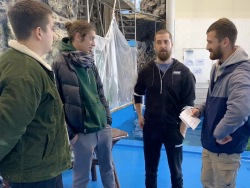Moscow Zoo staff members visit Primorsky Aquarium

Since biodiversity conservation through captive maintenance of rare and threatened species is one of the key missions of zoos and public aquariums, the meetings were focused on discussing how to set the stage for an exchange of collections between the two institutions with the purpose of avoiding overpopulation of individual species and reducing the risk of inbreeding (the interbreeding of closely related individuals). The zoo staff members from Moscow are renowned experts in the field of animal care – they have developed guidelines on husbandry and transportation of animals. In addition, these professionals are authors of works on species conservation and are engaged in scientific research.
Lead Coordinator of Collection Planning Andrey Barakovsky and Animal Husbandry Specialist Nikolay Goeots visited the Science and Acclimation Building and the Dolphinarium to examine the animal welfare conditions and the diversity of aquatic life in the Primorsky Aquarium.
They discussed effective practices of marine mammal training, diets and nutrition, as well as veterinary care methods. Nikolay Goeots said that, as he could see, the animal well-being principles were strictly followed at the Primorsky Aquarium and pointed out the facts of successful reproduction of marine mammals that had taken place in the facility. The guests and the hosts exchanged their views on unique year-old beluga calf Kalina, the first case of beluga whale breeding in Russian aquariums. They paid attention to her friendly disposition and her readiness to interact with humans.
“We’ve covered many important topics: we considered ways of cooperation on some animals, shared our experience and knowledge of animal import and export, and discussed legal procedures on the use of rescued wild animals and rehomed pets for collection restocking in accordance with Federal Laws No. 44-FZ and 223-FZ,” said Andrey Barakovsky. “Both our organizations are members of the Russian Zoo and Aquarium Association (SOZAR), and we have the same objectives in biodiversity conservation and sustaining wildlife populations. These are the main principles that will shape future cooperation between our institutions.”